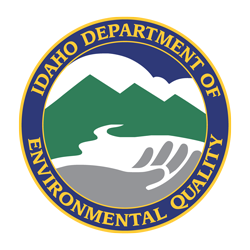July 12, 2022
SoilSHOP Date:
- Saturday, July 23 from 8 am to 8 pm MST
Contacts:
- Environmental inquiries: Kevin Kostka, Department of Environmental Quality, (208) 515-6696, Kevin.Kostka@deq.idaho.gov
- DHW media inquiries: Greg Stahl, Public Information Officer, Department of Health and Welfare, (208) 334-0668, Greg.Stahl@dhw.idaho.gov
- Property owner inquires: Drew Pendleton, Department of Health and Welfare, (208) 608-3915, Drew.Pendleton@dhw.idaho.gov
BOISE – The Idaho Department of Health and Welfare (DHW), Idaho Department of Environmental Quality (DEQ), and federal partners are hosting a free soil screening event for residents and property owners in Gilmore, Idaho.
The event will be held along Meadow Lake Road (Gilmore Road) on Saturday, July 23 from 8 am to 8 pm.
The “soilSHOP”—Soil screening, Health, Outreach, and Partnership—will provide community members with free lead screening of soil they gather from their property. The screenings are conducted in a matter of minutes, and the agencies will provide information on how people can reduce exposures to lead and other potentially harmful metals found in soil throughout the historic townsite and surrounding area.
Staff from the Lemhi Historical Society, Bureau of Land Management, and the United States Forest Service will also be on site to answer questions about Gilmore history, the surrounding mine lands, and wildfire prevention.
To participate in soil screenings, landowners need to collect a soil sample from their property and bring it to the soilSHOP on Meadow Lake Road (Gilmore Road). Sample collection involves gathering dry soil from areas a landowner is interested in screening and placing the soil into a clean plastic bag. Prior to the event, DHW and DEQ will mail landowners instructions with best practices for collecting soil samples. If needed, sample collection supplies will be available for free during the event.
Background
Large-scale hard rock mining and milling operations took place near Gilmore until the 1950s and left behind contaminated waste in the form of tailings, waste rock, and processed ore. Over time, human activities, wind, and water have distributed contaminated soil across the townsite and surrounding lands.
Lead and arsenic do not break down over time and will remain in soil unless removed. Sampling conducted by DEQ confirmed lead in soil at levels 50+ times higher than considered safe for residential use. Elevated levels of arsenic were also found in soil in some townsite locations.

